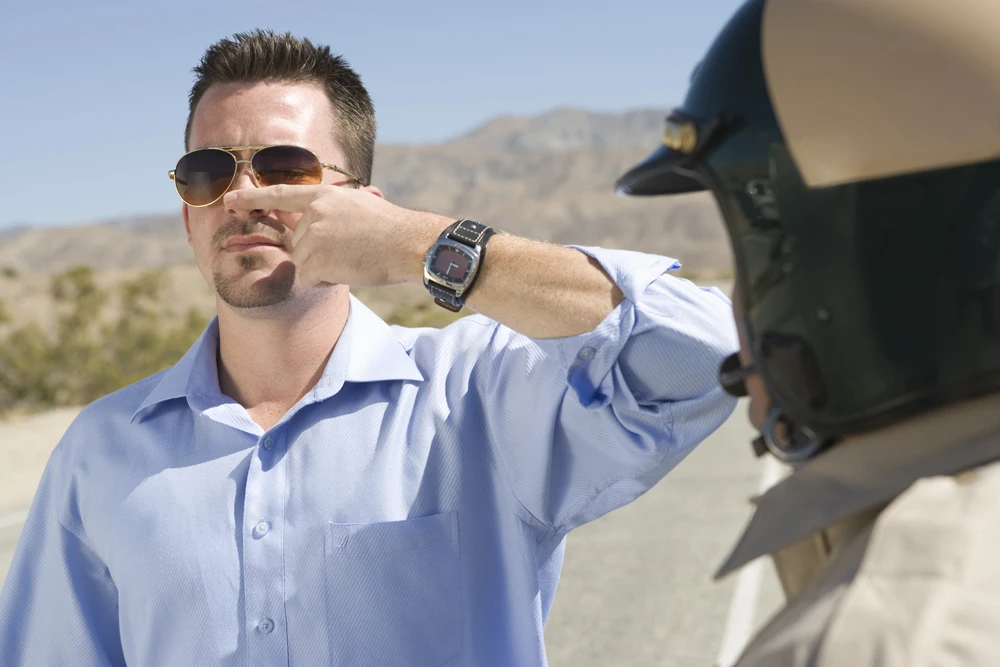You’re driving home from the bars one night, when suddenly, you see the red and blue lights start flashing before you. A police officer is pulling you over, and you think you might have to take a field sobriety test.
The Law Office of Dewey P. Brinkley wants you to know that you do have rights when you’re pulled over, and it is vital that you know them. Learn what you need to know about field sobriety tests and how you should conduct yourself to ensure that you do not incriminate yourself or give the prosecution any reason to conviction.
When you’re pulled over and the officer suspects that you’re intoxicated, he or she will ask you to step out of the vehicle. The officer will then administer what is known as a roadside sobriety test. These are tests that can usually be done by a sober individual. If an intoxicated person falls over or cannot walk without stumbling, then an officer might administer a breathalyzer test.

The driver must stand with one leg stretched out in front of them. The leg must be raised at least six inches off the ground. The driver will then count to 30 (“one-one thousand, two-one thousand, ect.). Certain clues that indicate a drunk driver include raising the arms out for balance, hopping around, dropping the foot too early, and swaying.
The driver will be required to walk heel-to-toe for nine whole steps, then turn around on the spot and walk nine steps back. The driver must also count each step aloud and look at his or her feet. The hands must remain at the side. Some of the indicators of intoxication include expanding arms or hands out for balance, missing a step by much more than a half an inch, stepping out or off the line, making an incorrect turn, taking the incorrect number of steps, and stopping the test too early.
This test is designed to test whether or not the eyes are twitching involuntarily (Nystagmus). The officer will ask the driver to follow a certain stimulus while keeping the head still. By moving the stimulus from left to right, the officer will look for six clues, three for each eye, that will tell him or her is your eyes are tracking smoothly:
Failure to pass one or more of these tests will not automatically convict you of a drunk driving charge, but the results could be used against you in a court of law.
Taking one or more of these tests is usually just step one. In most cases, officers will also pull out the AlcoSensor test, better known as a handheld breathalyzer machine, and ask you to blow into it. This test will show your level of intoxication at the moment.
What you do need to know if that this test cannot be used at any trial or in any courtroom. The officer who administered the test can only testify as to what the machine recorded.
As a driver, you are required to obey laws when you are being pulled over, just as you would at any other time. Remember these rules:
You do not have to:
You must:
Though you do not have to take these tests, it does not mean that you won’t be arrested. If an officer has probable cause to suspect that you’re drunk, then he or she will probably arrest you anyway. What you can do by remaining silent is limit the amount of evidence that can be brought against you by the prosecution.
A DWI conviction in Raleigh can mean serious trouble for you. You may have to pay heavy fines, and your license will more than likely be suspended for one year. Additionally, your car insurance might go up by as much as 400 percent, and you could even face up to two years in prison.
The important thing to remember is that even if you have been arrested for driving while impaired and you failed a BAC test, you still have legal options. You are not automatically found guilty. Speak with an experienced attorney at the Law Office of Dewey P. Brinkley.
Attorney Dewey P. Brinkley is a former Wake County prosecutor who has tried over 100 DWI cases in District Court. His experience as a Raleigh DWI Lawyer ensures your rights are protected, minimizes your penalties and can help find alternative forms of sentencing.
To schedule a free initial consultation with Mr. Brinkley, call us at 919-832-0307 or contact our offices online.

Certified Criminal Law Specialist by North Carolina State Bar.

Tried over 250 criminal cases in local courts.

Knows prosecution strategies from time as Assistant District Attorney.

Direct, responsive service from start to finish by Brinkley himself.

4.9-star client reviews praise professionalism and case outcomes.
Speak directly with Attorney Dewey Brinkley – 100% confidential and no obligation.
Before founding our Criminal Defense Law Firm in Raleigh, Attorney Dewey P. Brinkley worked for almost three years in the Wake County District Attorney’s office, gaining in-depth experience handling domestic violence, misdemeanors and juvenile court offenses.
As a Raleigh Criminal Defense Lawyer, he handles serious felony charges, including armed robbery and attempted murder, as well as DWI, traffic tickets and violations and misdemeanors. Whatever charge you face, we can help.